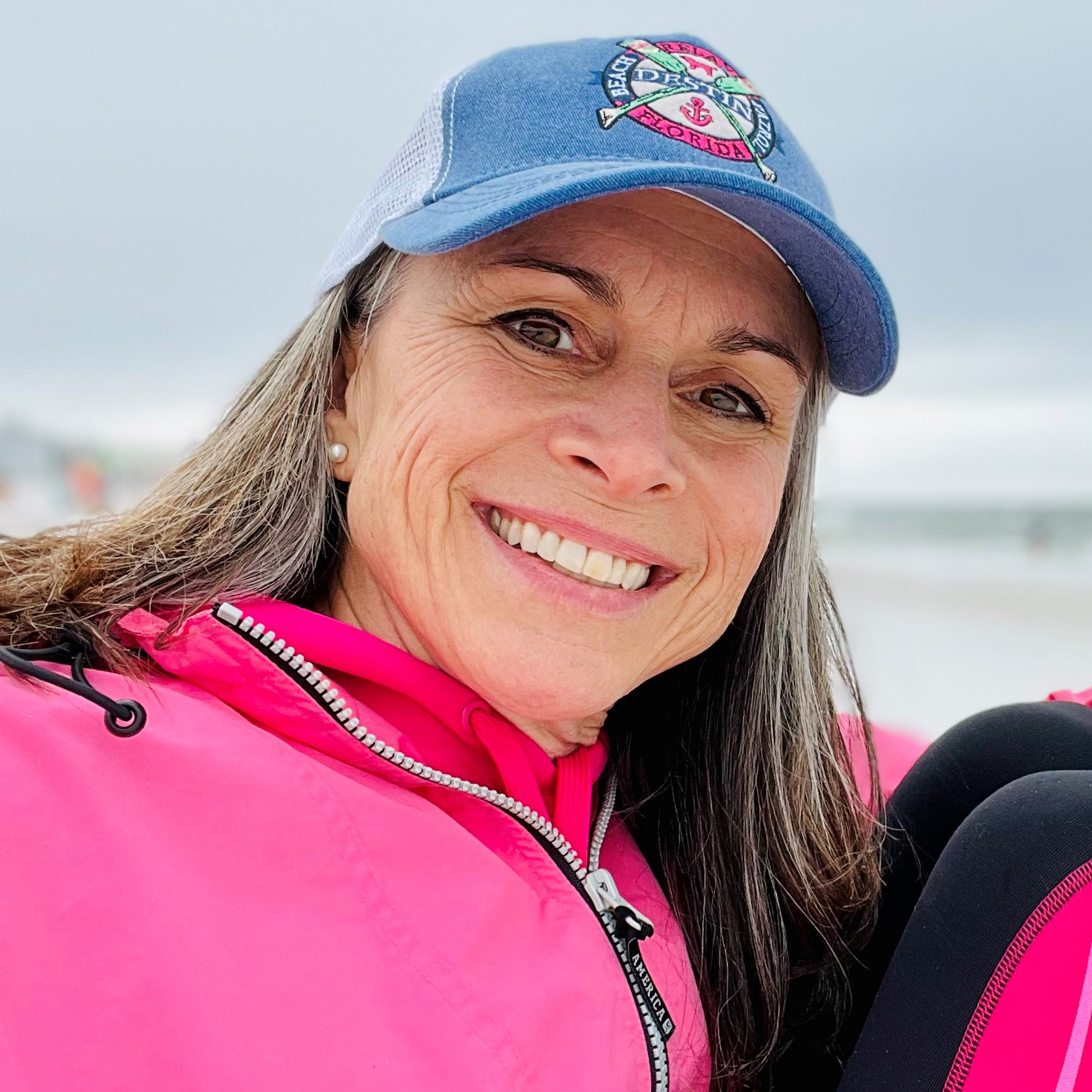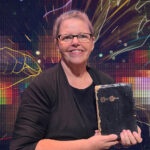
Robyn Florian
Robyn Florian led public relations and marketing at her alma mater, Greenville University, for 12 years before entering her own season of wilderness wandering and wondering through experiences in prison ministry, disaster relief, homeless care and those dealing with medical crises. Almost 14 years later, this journey has led to the development of The Hope-Brained Way: Reinterpreting Brokenness Through Reparative Restory via Trauma-Informed Spiritual Formation (hopebrained.com). She graduates this May with an M.A. in Christian ministry from Liberty University and a D.Min. in ministry leadership from Asbury Theological Seminary.
Hope-Brained Stewardship of the Targeted, Trauma-Informed, Transgenerational Flow of God’s Spirit at Asbury
By Robyn Florian
“The Lord rebuilds Jerusalem, and gathers the exiles of Israel. He heals the brokenhearted, and bandages their wounds.” (Psalm 147:2–3 NET)
After four years and thousands of hours of targeted attunement to trauma-informed spiritual formation in Christian leaders as an Asbury Theological Seminary doctoral student and hundreds of transgenerational conversations (otherwise known as lectures and discussions) about worldview and redemptive storytelling with my students as an Asbury University adjunct professor, God had my full attention when He began showing up in targeted, trauma-informed and transgenerational ways in Wilmore, Kentucky, last month.
_
“I believed God was showing up there, but I wasn’t sure I was supposed to enter…”
_m
I was putting some finishing touches on the first draft of the last chapter of my dissertation, The Hope-Brained Way: Reinterpreting Brokenness Through Reparative Restory, as pictures of revival-like activities in AU’s Hughes Auditorium, the birthplace for the “Asbury Outpouring,” started flowing into my Facebook feed on Wednesday, Feb. 8, 2023. My afternoon thought was one of curiosity for what God might be doing at Hughes mixed with intensity about what I needed to be doing in my office. I sensed God wanted me to finish writing while continuing to watch my social feeds for what was transpiring across the street. My evening thought became one of uncertainty in response to the sacred space I saw forming these students. I believed God was showing up there, but I wasn’t sure I was supposed to enter it as someone whose age reflected more of parent and professor.
But, as I closed my laptop around 11:30 p.m. and prepared to go to sleep, I took one last look at Facebook. This time I saw faces of my students in those pictures, and I knew God was calling me to be there for them. Over the next few days (at all hours of the day and night), I positioned myself on my knees with arms extended in the back right corner of the auditorium praying for God to show up for my students in a tangible way. I felt compelled to “hold the room” for them in a way I couldn’t really explain but sought to obey.
As praying for my students in the back of Hughes shifted to participating in the prayer team at the altar and later in the balcony, I watched as a nourishing outpouring of God’s presence in “worship and word” shifted to an “infilling” of God’s power, as evidenced by individual “confession and repentance” followed by corporate “forgiveness and intercession,” and then to overflowing “celebration and testimony” to God’s providence. I watched with wonder as God drew more and more brokenhearted people to the deep well of His presence here in Wilmore, motivated by a sundry of expectations, and I encouraged them to draw from the water of His outpouring presence with surrendered expectancy. I prayed for the infilling work to dislodge the debris that has settled in so many of our souls, believing the nourishing, cleansing and renewing flow of His Spirit could clear the way for overflowing tears of gratitude, joy and peace.
Outpouring events of “God withness” often compel people into deep, baptismal-like, infilling experiences — what I refer to in The Hope-Brained Way as “godward wilderness” Exodus-like journeys — that result in overflowing effects of “gospel witness” in the kingdom. It’s in the commitment to the wilderness walk of intensive soul care where false-self masks, coping strategies and idols give way to true-self makeovers, hoping strategies and altars. This is the hope of revival-like awakening … outpouring to infilling to overflowing.
_
“I also think we’re all a bit more dehydrated than normal by all the tears we’ve shed in the last few years of COVID and challenging cultural conversations.”
_m
Over the course of the first two weeks of this move of God at Asbury, I saw the outpouring of God’s presence saturate thousands of thirsty people, believers who often seek to nurture a relationship with God on left-brained food (information) alone versus whole-brained food and water (information and experiences). Those willing to traverse desert conditions desperately need water, experiences with God in addition to information about God. I also think we’re all a bit more dehydrated than normal by all the tears we’ve shed in the last few years of COVID and challenging cultural conversations. As people who hunger and thirst for righteousness (Matthew 5:6), I believe we desperately needed rehydration, the refreshing, recirculating, re-anointing work of the Holy Spirit (Psalm 42).
There is something about water that does a softening, repairing and restoring work that only water can do. “Jesus stood and said in a loud voice, ‘Let anyone who is thirsty come to me and drink. Whoever believes in me, as Scripture has said, rivers of living water will flow from them.’ By this he meant the Spirit, whom those who believed in him were later to receive” (John 7:37–39a).
Over the last few weeks, I’ve learned about rhythms of revival-generating events in the church and experiences with Father, Son and Spirit capable of flowing like a river into awakening-stewarding effects for our culture. If someone would have asked me to describe the rhythms of revival prior to Feb. 8, I think words like “worship and word,” “confession and repentance,” and “forgiveness and intercession” might have escaped my lips in some form or fashion, but it was the vocation of revival — celebration, testimony and the overflowing witness of the Spirit in response to God’s outpouring presence — that captivated my imagination during and since.
Beth Moore states, “We witness from withness.” How will we put our worship to work in the world on the other side of this targeted, trauma-informed and transgenerational baptismal wilderness wandering and wondering in Wilmore?
Targeted Outpouring
God has shown up in very specific ways throughout this outpouring, meeting specific needs through specific people with specific gifts and experiences. I was connecting prayer team members with people at the altar and, at the end of the day, one of the prayer team members, who serves as lead pastor for a local church, walked up to me and said, “Robyn, you’ve connected me with eight or nine pastors today.” We both knew only God could orchestrate such targeted connections, for these pastors and so many others.
God positioned me to experience His targeted, specific presence on Day 5 while serving on the prayer team. I was approached by a young lady who sensed God directing her to meet me. After a very brief conversation, we were “interrupted” (in the best way) as the young lady was saying, “I need to leave but I don’t think God’s done with me here yet.”
_
“I’ve never heard someone pray through the biology of repair for someone’s body like I did that day.”
_m
We paused as a determined grandmother guided her hesitant granddaughter straight to us. The grandmother shared about her granddaughter’s recent and rare medical diagnosis as well as the pain that threatened to shorten her granddaughter’s stay in the auditorium. She said, “We need to leave but I knew we shouldn’t leave until we asked someone to pray for her. She feels uncomfortable going to the altar.”
As I started to pray with them in the aisle, the young lady who had initially approached me looked at the grandmother and said, “I’m a doctor and I treat patients with this disease, would you mind if I prayed as well?”
With my mouth agape and eyes awestruck, I knew well enough to step out of the way and allow the doctor to tend to the patient. I’ve never heard someone pray through the biology of repair for someone’s body like I did that day. After the prayer, I encouraged the granddaughter to write down the targeted, specific way God had met her in her pain that day. I won’t ever forget it, and I didn’t want her to forget it either.
Trauma-Informed Infilling
Viewed though a trauma-informed, hope-brained lens, reconciling outpouring facilitates a reparative infilling followed by a more resilient overflowing work. God’s presence coopts the 3 Es of trauma—painful events that cause damaging experiences that lead to lasting negative effects — for trauma-informed care and repair. Encouraged by a new event to encounter the outpouring love of a Father, God’s people are equipped with new experiences to encode the infilling mind of Christ and empowered by new positive effects to embody the overflowing presence of the Spirit.
The Hope-Brained Way of trauma-information spiritual formation facilitates emotional healing and identity reformation through gospel reframing and Spirit-filled transformation. The outpouring, infilling, overflowing work of awakening literally changes people’s minds, and the wonder of it all is not lost on me.
Transgenerational Overflow
From the first night of the outpouring, God confirmed He was moving across the generations, in the room and in the world. When I asked God for clarification about the transgenerational work He activated through this outpouring, He brought Joshua and Caleb to mind. That God would bring these two to mind wasn’t all that shocking to me, considering how He had led me to equate exodus with soul care in my research. God and I had been having lots of conversations about second crossings and Promised Land-like vocational purposes on the other side of wilderness wandering and wondering.
But, if you would have asked me before that very moment who Joshua and Caleb led across the Jordan River I would have said, “their peers.” In spite of all of the research I had done up to that point, this was the image in my mind. As I leaned into what God wanted me to know about Joshua and Caleb in light of this work in Wilmore, I caught my breath (truth be known, I’m still catching my breath) with the realization that Joshua and Caleb didn’t lead their peers across the Jordan. They had all died. Joshua and Caleb led the next generation out of the wanderlust wilderness, and into new wonder-filled work in their world.
_
“How do we attend to generational reconciliation and repair in a way that produces more resilience in the church and in our churches?”
_m
So what does this mean for my peers, Generation X, my Gen-Y millennial sons and their peers, and for my Gen-Z students, in relation to Christian leadership? How do we attend to generational reconciliation and repair in a way that produces more resilience in the church and in our churches? The timing of this article finds me in process, still processing what God wants me to know, hear, see and embody as it relates to this targeted, trauma-informed and transgenerational flow of His Spirit at Asbury. I find myself wrestling with the phrase “spiritual parenting,” along with the deeper work of “Spirit-led reparenting.” Complementing and, at times, correcting the work of earthly parents and caregivers, spiritual parenting invites older generations to mend brokenness and tend to wholeness in younger generations.
No parent is perfect — in the family or in the church — and we need to address a transgenerational overflow of attachment wounds with the transcendent outpouring work of God’s affection. Research by C.R. Snyder and Anthony Scioli suggests actionable hope requires hope-filled attachments, pathways and agency. It is my prayer that this experience at Asbury will affect our attachment to Father God through the pathway of affective abiding in Jesus with affect-laden agency He has given us through His Spirit … a Spirit-led reparenting.
I will never be the same on this side of this reconciling event, with its reparative experiences and the resilient lasting effects, called the Asbury Outpouring. I believe we — the church — will never be the same. The hope found in God’s withness and the healing formed in this Godward wilderness journey fortify us for a flourishing gospel witness in this world.
“We will tell to the coming generation the glorious deeds of the Lord and his might and the wonders that he has done … that the next generation might know them, the children yet unborn, and rise up and tell them to their children, so that they should set their hope in God, and not forget the works of God, but keep his commandments.” (Psalm 78:4b,6–7 NRSVUE)
+

Robyn Florian
Robyn Florian led public relations and marketing at her alma mater, Greenville University, for 12 years before entering her own season of wilderness wandering and wondering through experiences in prison ministry, disaster relief, homeless care and those dealing with medical crises. Almost 14 years later, this journey has led to the development of The Hope-Brained Way: Reinterpreting Brokenness Through Reparative Restory via Trauma-Informed Spiritual Formation (hopebrained.com). She graduates this May with an M.A. in Christian ministry from Liberty University and a D.Min. in ministry leadership from Asbury Theological Seminary.









